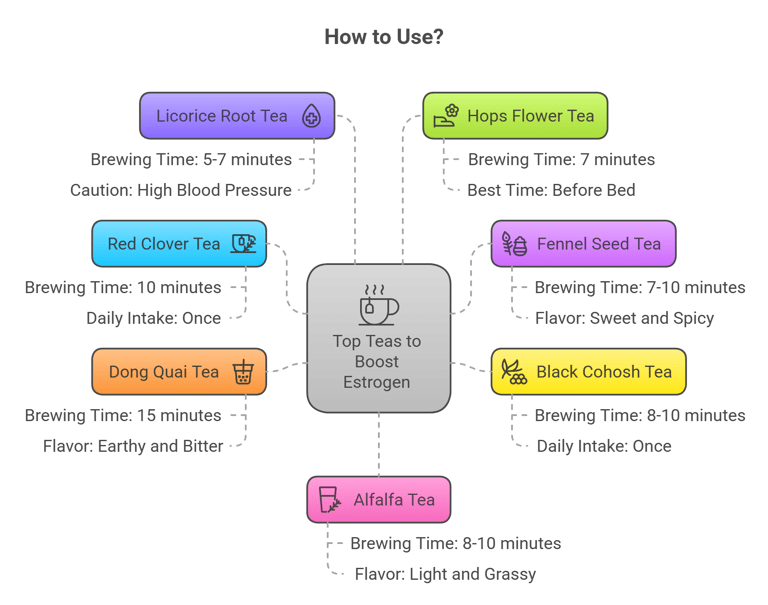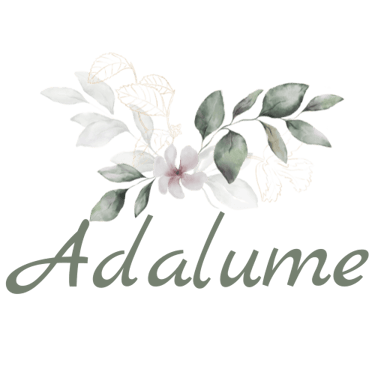7 Best Herbal Teas That Naturally Increase Estrogen and Support Hormonal Balance
Discover the top herbal teas that may help increase estrogen naturally and ease hormonal symptoms like mood swings, low energy, and irregular cycles. Sip your way to balance—gently.
10 min read
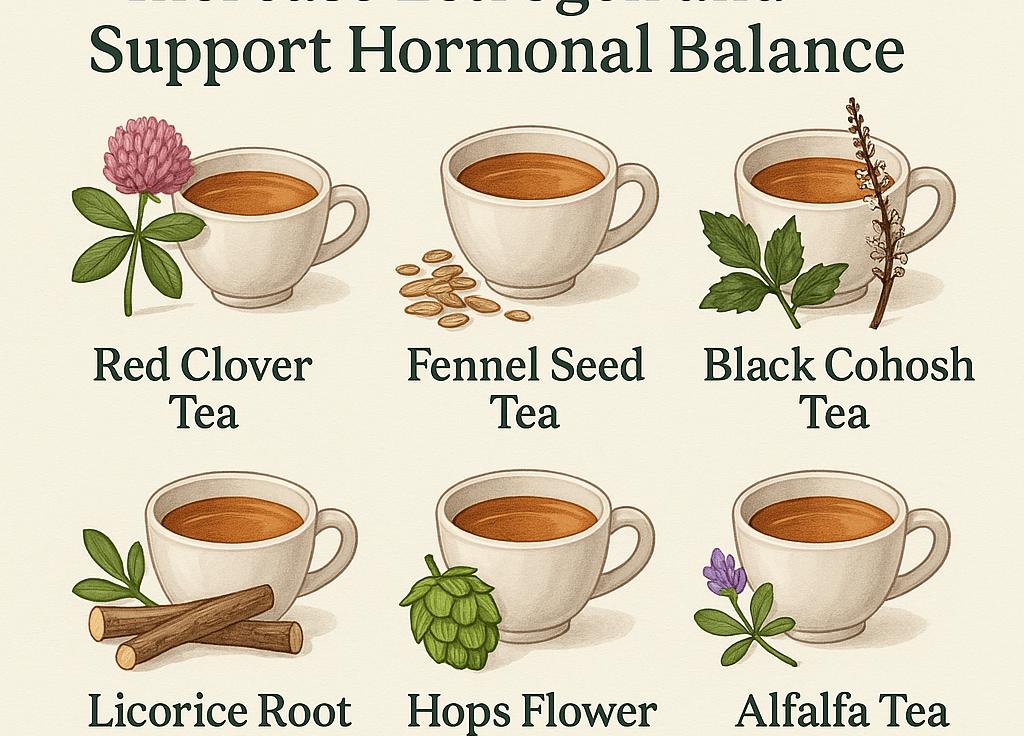

Teas That Increase Estrogen Naturally: A Gentle Guide to Hormonal Wellness
1.The Estrogen–Wellness Connection
Estrogen plays a powerful role in women’s overall wellness. From glowing skin and stable moods to healthy energy levels and a balanced menstrual cycle, this key hormone supports many of the things that help us feel in sync with our bodies. When estrogen levels dip—whether due to stress, lifestyle, perimenopause, or other hormonal shifts—it can leave us feeling out of balance, fatigued, or disconnected from ourselves.
That’s where natural support comes in. More and more women are turning to gentle, plant-based solutions like herbal teas to help nourish their hormones from within. Known for their calming properties and natural compounds called phytoestrogens, these teas may offer subtle support for increasing estrogen and promoting harmony in the body.
Whether you’re navigating estrogen dominance, low estrogen symptoms, or simply seeking tea to balance female hormones, this guide will walk you through the best herbal blends that work in tune with your body—naturally.
2. What Causes Low Estrogen in Women?
Estrogen levels naturally rise and fall throughout a woman’s life, but certain phases and lifestyle factors can cause more noticeable dips—bringing uncomfortable symptoms and a sense of hormonal imbalance.
Common Life Phases That Trigger Low Estrogen
Perimenopause & Menopause
As women approach menopause (typically between ages 40–55), estrogen production gradually declines. This transitional phase—called perimenopause—can last several years and is often marked by irregular periods, mood swings, and hot flashes.Postpartum Recovery
After childbirth, estrogen drops significantly. While this is a normal part of the postpartum period, some women experience prolonged low levels that affect mood, energy, and libido.Chronic Stress
When your body is under constant stress, it prioritizes survival hormones like cortisol over reproductive hormones like estrogen. Over time, this can lead to hormonal imbalances and worsen symptoms.Excessive Exercise or Low Body Fat
Women with very low body fat or intense exercise routines (especially athletes) may experience low estrogen due to disrupted ovulation or amenorrhea (missed periods).Nutritional Deficiencies & Restrictive Diets
Estrogen production requires essential vitamins and fats. Diets lacking in healthy fats, protein, and key nutrients like B6, D, and magnesium can impair natural hormone synthesis.
🌡️ Symptoms of Low Estrogen
Every woman’s body reacts differently to hormonal shifts, but the most common symptoms of low estrogen include:
Hot flashes or night sweats
Fatigue and brain fog
Vaginal dryness or discomfort
Mood swings or irritability
Irregular or missing periods
Low libido
Dry skin and thinning hair
Sleep disturbances
These symptoms can affect daily life, energy levels, and even your confidence. If you’re wondering how can I raise my estrogen levels quickly, herbal teas—alongside nourishing foods and mindful self-care—may offer gentle, natural support to help your body restore balance.
3. How Teas Help Support Estrogen Naturally
Herbal teas have long been used in traditional medicine to support women’s hormonal health. In recent years, science has begun to back what herbalists have known for centuries: certain plants contain compounds that gently mimic or support the body’s natural hormone processes.
🌿 Phytoestrogens: Nature’s Gentle Hormone Helpers
Some herbal teas are rich in phytoestrogens—plant-based compounds that have a structure similar to estrogen. While not identical to the estrogen your body produces, these compounds can interact with estrogen receptors in your cells and help modulate hormone activity.
This makes phytoestrogen-rich teas especially helpful for:
Supporting estrogen levels during perimenopause or menopause
Easing PMS and menstrual irregularities
Promoting skin hydration, bone strength, and mood balance
🌸 Why Choose Tea for Hormone Balance?
Tea is one of the most soothing and accessible ways to introduce hormone-supportive herbs into your daily routine. Compared to capsules or tinctures, sipping tea feels ritualistic and relaxing—inviting you to slow down and create space for wellness.
You might reach for tea to balance female hormones if you:
Feel out of sync with your cycle
Struggle with mood or fatigue linked to low estrogen
Want to explore natural, non-synthetic options before turning to hormone therapy
🩺 Sidebar: When to Talk to a Doctor About Low Estrogen
While herbal teas can offer gentle support, they’re not a substitute for medical advice—especially if you're dealing with severe symptoms, fertility challenges, or a hormone-sensitive condition like PCOS or endometriosis.
See a healthcare provider if you experience:
Persistent irregular or absent periods
Severe hot flashes or night sweats
Ongoing fatigue, depression, or brain fog
A history of hormone-related cancers
These may be signs of a deeper hormonal issue that requires testing or treatment beyond lifestyle changes.
4. Top Teas To Boost Estrogen
Certain herbal teas are naturally rich in phytoestrogens or hormone-supportive compounds that may help regulate or increase estrogen levels. Whether you’re navigating perimenopause, dealing with irregular cycles, or just want to gently support your hormonal health, these teas offer plant-based comfort with added wellness benefits.
🌸 1. Red Clover Tea
Why It Helps:
Red clover is one of the most well-known sources of isoflavones, a type of phytoestrogen. These compounds may help mimic estrogen in the body, easing symptoms like hot flashes, mood swings, and hormonal dryness.
Best For:
Perimenopause and menopause support
Estrogen deficiency
Hormonal skin and mood issues
🌿 2. Fennel Seed Tea
Why It Helps:
Fennel contains anethole, a potent phytoestrogen that may help boost natural estrogen production while easing cramps and digestive bloating.
Best For:
PMS symptoms
Menstrual cramps
Low estrogen-related fatigue
🌼 3. Black Cohosh Tea
Why It Helps:
Traditionally used in herbal medicine for menopause, Black Cohosh doesn’t contain phytoestrogens but may stimulate estrogen receptors to reduce symptoms like hot flashes and night sweats.
Best For:
Menopause or perimenopause
Sleep disturbances due to low estrogen
🌿 4. Dong Quai Tea
Why It Helps:
Nicknamed “female ginseng,” Dong Quai is an adaptogenic root used to regulate estrogen and progesterone levels. It promotes circulation to reproductive organs and may ease PMS and menopausal symptoms.
Best For:
Cycle irregularity
Hormonal acne
Reproductive health support
🍃 5. Licorice Root Tea
Why It Helps:
Licorice contains mild phytoestrogens and supports adrenal health, which is deeply connected to hormone balance. It can help balance estrogen and cortisol, especially under chronic stress.
Best For:
Low estrogen linked to stress
Energy crashes and cravings
🌸 6. Hops Flower Tea
Why It Helps:
Hops, commonly used in beer, is one of the strongest phytoestrogen sources among herbs. It’s also incredibly calming and may promote restful sleep.
Best For:
Menopausal symptoms
Mood swings and insomnia
Estrogen dominance support
🍃 7. Alfalfa Tea
Why It Helps:
Alfalfa is rich in plant estrogens and also provides minerals that support overall hormone function like magnesium, calcium, and vitamin K.
Best For:
Nutritional hormone support
Gentle estrogenic effects
How to Pair
Morning: A cup of red clover tea + chia pudding with berries and flax
Afternoon: Fennel tea + a spinach salad with sesame dressing and avocado
Evening: Hops tea + a small serving of wild salmon or tempeh stir-fry
By syncing your tea with nutrient-dense meals and supplements, you're creating a more complete wellness strategy that supports natural estrogen production without synthetic hormones.
7. Who Should Avoid Estrogenic Teas?
While herbal teas that support estrogen can be a beautiful addition to a wellness routine, they aren’t for everyone. It’s important to understand when these natural remedies might not be suitable—or when it’s best to consult a healthcare professional before adding them to your daily ritual.
When to Be Cautious
Some individuals may need to limit or avoid phytoestrogen-rich teas entirely, especially if they fall into one of the following categories:
1. Hormone-Sensitive Conditions
If you have or have had estrogen-sensitive cancers such as:
Breast cancer
Ovarian cancer
Uterine (endometrial) cancer
Then it’s essential to avoid herbs like red clover, hops, and licorice root, as these may interact with hormone receptors in ways that could be harmful.
2. Pregnant or Breastfeeding Women
Many estrogenic herbs are not recommended during pregnancy or while nursing, as they can stimulate uterine activity or pass through breast milk. Teas like dong quai and black cohosh should be especially avoided.
3. Women Taking Hormonal Medications
If you're on hormone replacement therapy (HRT), birth control pills, or other hormonal medications, always check with your doctor before adding herbal hormone-supporting teas. Some herbs may amplify or interfere with your prescribed treatment.
4. Individuals with High Blood Pressure
Certain teas like licorice root can raise blood pressure if consumed regularly or in large amounts. Use sparingly or choose alternatives with milder effects.
When in Doubt, Consult a Pro
Natural doesn’t always mean safe for every body. If you’re dealing with:
Irregular or absent periods
Severe PMS or menopause symptoms
Fertility concerns
An autoimmune condition
A complex medical history
…it’s best to seek guidance from a naturopathic doctor, herbalist, or functional medicine provider. They can help you personalize your approach and avoid unintended side effects.
8. Frequently Asked Questions (FAQs)
These are some of the most common questions women ask when looking to support their estrogen levels naturally using herbal teas. Let’s clear things up with practical, evidence-informed answers.
Can herbal tea really increase estrogen levels?
Herbal teas don’t contain estrogen itself, but some—like red clover, fennel, and hops—contain phytoestrogens, which are plant-based compounds that can gently mimic estrogen in the body. This makes them a popular natural option for supporting hormonal balance, especially during perimenopause or PMS.
How long does it take for estrogen-boosting teas to work?
This varies from person to person. Some women notice subtle improvements—like better mood, reduced hot flashes, or improved energy—within a few weeks. For others, it may take 4–8 weeks of consistent use. Herbal teas work best as part of a long-term, supportive routine rather than a quick fix.
Which tea is highest in phytoestrogens?
Red clover and hops flower tea are considered some of the most concentrated sources of phytoestrogens among herbal teas. They may be especially helpful for women with symptoms related to low estrogen, such as hot flashes or dry skin.
Can tea help with estrogen dominance?
Yes—certain teas may help regulate estrogen metabolism rather than simply increase it. For example, licorice root and spearmint tea may support estrogen balance by modulating other hormones like cortisol or testosterone, especially helpful in cases of PCOS or hormonal acne. Always consult a practitioner if you're unsure whether you need to increase or decrease estrogen.
Are there any side effects of hormone balance teas?
Some side effects may occur if:
Teas are consumed in excessive amounts
They interact with prescription medications
You have a sensitive condition (e.g., pregnancy or hormone-sensitive cancer)
Common reactions include mild nausea, bloating, or changes in menstrual cycle timing. That’s why it’s best to start slow and observe.
Should I combine herbal tea with vitamins or supplements?
Yes! Herbal teas can work beautifully alongside vitamins that support estrogen production, like vitamin B6, vitamin D, and magnesium. Combining teas with a nutrient-rich diet enhances results and supports your body from multiple angles.
9. Conclusion
Hormonal balance isn’t about quick fixes—it’s about nurturing your body in ways that feel natural, supportive, and sustainable. Whether you're navigating perimenopause, working through cycle irregularities, or simply tuning into your body’s needs, estrogen-supporting teas offer a gentle way to reconnect with your feminine rhythm.
From the phytoestrogen-rich red clover to calming hops and hormone-regulating dong quai, these herbal blends have been used for generations to help women feel more aligned, more energized, and more at ease in their skin.
As always, listen to your body, go slowly, and treat each cup as a moment of nourishment—not just for your hormones, but for your entire self.
✨ Ready to make your tea ritual part of your self-care journey? Explore more hormone wellness tips, tea guides, and daily rituals on Adalume.
Let’s continue creating beauty—inside and out—together.
Explore More from Our Wellness Blog:
6 Most Effective Herbal Teas to Correct Hormone Imbalance Naturally
Stress, Skin & Cortisol: How to Lower Cortisol and Glow from Within
The Healthy Side of SkinnyTok: Mindful Eating, Wellness Hacks & Sustainable Weight Loss
PCOS Meal Plan Breakdown: How to Balance Blood Sugar Naturally and Support Hormone Health
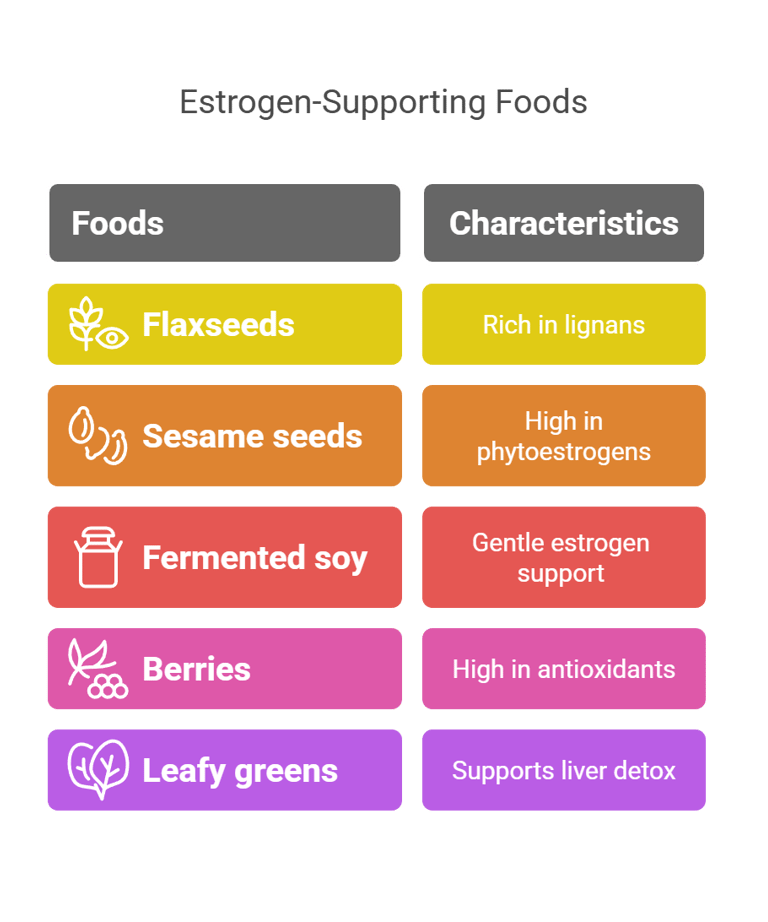

Estrogen-Supporting Foods to Add to Your Diet
Combining teas with certain foods may help your body make the most of its natural estrogen pathways. Try to include:
Flaxseeds – One of the richest sources of lignans, a plant-based estrogen compound
Sesame seeds – Also rich in phytoestrogens and healthy fats
Fermented soy (like tempeh or miso) – Gentle support for estrogen levels
Berries – High in antioxidants and hormone-supportive nutrients
Leafy greens – Support liver detox, which is essential for hormone balance
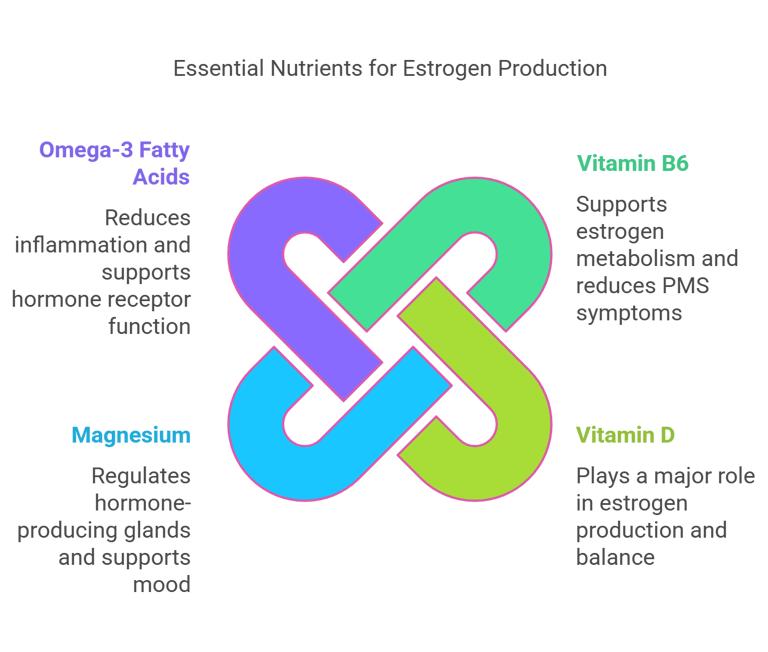

5. Best Practices for Drinking Estrogen-Boosting Teas
Herbal teas can be a beautiful way to reconnect with your body, but like any wellness ritual, it’s important to approach them with intention and awareness. If you're adding estrogen-boosting teas to your routine, here are a few simple guidelines to help you get the most out of them.
1. Start Slow and Observe
Begin with one tea at a time and pay attention to how your body responds. Everyone's hormonal blueprint is different, so it’s important to listen to your body’s feedback. Start with one cup a day and adjust based on your needs and tolerance.
2. Time Your Tea With Your Cycle
If you’re still menstruating, syncing herbal teas with your cycle may enhance their benefits:
Follicular Phase (Day 1–14): Focus on teas like red clover or alfalfa that gently support estrogen.
Luteal Phase (Day 15–28): Dong quai or fennel may help ease PMS symptoms and support overall balance.
For those in perimenopause or menopause, daily use is fine—just keep dosage light and consistent.
3. Combine With Nourishing Foods
To truly support estrogen production, herbal teas work best when paired with a nutrient-rich diet. Include foods high in healthy fats, protein, and essential nutrients like:
Flaxseeds, sesame seeds (rich in lignans)
Leafy greens and whole grains
Omega-3-rich foods (like walnuts or chia seeds)
This combination can provide your body with the building blocks it needs to regulate hormones naturally.
4. Rotate Teas to Avoid Overload
While phytoestrogens are gentle, long-term use of a single herb (like licorice or black cohosh) may not be suitable for everyone. Rotate your teas every few weeks or take short breaks to avoid dependency or side effects.
5. Know When to Pause or Avoid
Some herbal teas may not be appropriate for:
Pregnancy or breastfeeding
Individuals with hormone-sensitive conditions (e.g., breast cancer)
Those taking hormone medications or antidepressants
If you fall into any of these categories, speak with a healthcare provider before adding herbal teas to your wellness routine.
6. Make It a Ritual, Not a Quick Fix
Consistency is more powerful than intensity. Enjoying a cup of herbal tea daily—ideally at the same time each day—can create space for mindfulness, nourishment, and hormone support. Think of it as a long-term lifestyle choice, not a fast solution.
6. Pairing Teas with Estrogen-Supporting Vitamins & Foods
While herbal teas can gently support estrogen levels, pairing them with nourishing foods and essential nutrients can make your results even more effective. Think of this approach as building a strong foundation for your hormones—where tea is just one (very soothing) piece of the puzzle.
Vitamins That Help Support Estrogen Production
Certain vitamins and minerals are essential for healthy hormone synthesis, especially when you're looking to naturally raise estrogen. Here are a few to focus on:
Vitamin B6
Supports estrogen metabolism and reduces symptoms of PMS. Found in: bananas, chickpeas, salmon, leafy greens.
Vitamin D
Technically a hormone, vitamin D plays a major role in estrogen production and balance. Found in: sunshine, mushrooms, fortified foods, or supplements.
Magnesium
Helps regulate hormone-producing glands and supports relaxation and mood. Found in: dark chocolate, almonds, spinach, and pumpkin seeds.
Omega-3 Fatty Acids
Reduce inflammation and support hormone receptor function. Found in: flaxseeds, walnuts, chia seeds, salmon.
